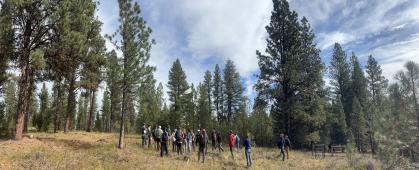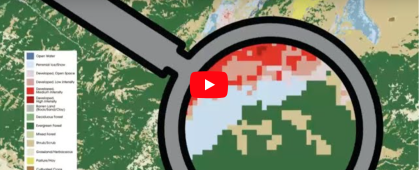The online learning game, Crash Course is a virtual college simulation that introduces players to various STEM concepts and pathways. In step with the goals of the CREWS project, Crash Course integrates several water-related themes into course content, dialog between players and non-player characters (NPCs), social meetups, university clubs, and the history of the campus lake. For example, players may take courses in Water Chemistry, Hydrology, Water Policy, and Ecology where they will learn about the history of the Clark Fork River, water conservation and restoration, and the integral role water plays in providing life on Earth.
Players may also speak with NPC professors and graduate students to learn about a variety of research possibilities and careers within STEM specifically related to water research and sustainability. For example, chemistry professor Dr. Jones shares how he became passionate about water restoration and encourages students to pursue work wherever their passion meets a need in the world. Dr. Maka, an environmental science professor, normalizes the time it takes to determine one’s major and career interests as well as the perseverance required to get through difficult STEM courses.
Additionally, NPC friends highlight water-related research projects, many of which are based on CREWS research. Pablo uses drone images to estimate algae levels in bodies of water, Liling researches the effects of mine waste in riparian food webs, and Constanza develops water decontamination techniques using magnets. While fictional, these NPC characters are a conduit to the authentic stories, research, and advice of CREWS faculty and student researchers.
Conversations with NPC professors and peers also open opportunities for players to participate in water-related social engagements, such as a 5K run/walk fundraiser for water restoration, campus clubs like the Backcountry Anglers and Water Conservation Club, volunteer opportunities such as visiting a local middle school to teach a lesson on water filtration techniques, and even undergraduate research opportunities, like studying sandhill cranes with environmental science professor, Dr. Raptis. Players are also invited to attend two guest speaker lectures on water-themed topics, including the impact of climate change on watersheds and water’s role in climate regulation.
Finally, the history of the campus lake also shapes the overall narrative of gameplay. When players interact with the NPC Mio, they learn how the lake has changed over time and the integral role wetlands play in filtering out pollutants from bodies of water. Mio shares some of her research on water quality and invites players to view her water samples in Dr. Jones’ lab. Similarly, the NPC Eli expresses concern for the deterioration of local waterways and envisions the positive impact he could have if he pursued a career in freshwater ecology. All in all, our hope is that these numerous opportunities to engage with the stories and activities related to CREWS research will encourage young players, especially those from underrepresented groups, to cultivate a vision for themselves in a STEM career.

